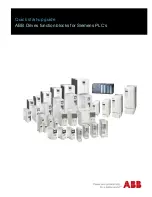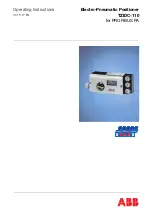
5
Categories and Use of Basic Application Instructions
DVP-PM Application Manual
5-9
Equation
( )
127
;
.
1
2
1
=
×
×
−
−
B
M
B
E
S
Therefore, the range of 32-bit floating point value is from ±2
-126
to
±2
+128
, i.e. from ±1.1755×10
-38
to
±3.4028×10
+38
Example 1: Represent “23” in 32-bit floating point value
Step 1: Convert “23” into a binary value: 23.0 = 10111
Step 2: Normalize the binary value: 10111 = 1.0111 × 24, in which 0111 is mantissa and 4 is exponent.
Step 3: Obtain the exponent:
∵
E – B = 4
Æ
E – 127 = 4
∴
E = 131 = 10000011
2
Step 4: Combine the sign bit, exponent and mantissa into a floating point
0 100
0001
1 011
1000
0000
0000
0000
0000
2
= 41B80000
16
Example 2: Represent “-23.0” in 32-bit floating point value
The steps required are the same as those in Example 1 and only differs in modifying the sign bit into “1”.
1 100
0001
1 011
1000
0000
0000
0000
0000
2
=C1B80000
16
DVP-PM uses registers of 2 continuous No. to store a 32-bit floating point value. For example, we use registers
(D1, D0) for storing a binary floating point value as below:
S
E7
E6
E5
E1
E0 A22 A21 A20
A6
A5
A4
A3
A2
A1
A0
b0
b1
b2
b3
b4
b5
b6
b20
b21
b22
b23
b24
b28
b29
b30
b31
2
2
2
2
2
2
2
2
2
2
2
2
2
2
2
7
6
5
1
0
-1
-2
-3
-17
-18
-19
-20
-21
-22
-23
D1(b15~b0)
D0(b15~b0)
8 bits of exponent
23 bits of mantissa
Sign bit (0: positive 1: negative)
When b0~b31 is 0, the content is 0.
Hidden decimal point
Decimal Floating Point
Since the binary floating point value is not very user-friendly, we can convert it into a decimal floating point value
for use. However, the floating point operation in DVP-PM is still operated in binary floating point format..
The decimal floating point is represented by 2 continuous registers. The register of smaller number is for the
constant while the register of bigger number is for the exponent.
Example: Store a decimal floating point in registers (D1, D0)
Decimal floating point = [constant D0] x 10
[exponent D1]
Constant D0 = ±1,000 ~ ±9,999
Exponent D1 = -41 ~ +35
Note:
The constant 100 does not exist in D0 because 100 is represented as 1,000 × 10
-1
. The range of
decimal floating point is ±1175 × 10
-41
~ ±3402×10
+35
..
The decimal floating point value can be used in the following instructions:
DEBCD: Convert binary floating point into decimal floating point
DEBIN: Convert decimal floating point into binary floating point
In O100 ~ M102 main programs, the execution result will affect the status of M1968 ~ M1970 when using
ADD/SUB/MUL/DIV instructions. Zero flag (M1968), borrow flag (M1970) and carry flag (M1969) will also be
Summary of Contents for DVP-10PM
Page 1: ......
Page 45: ...2 Hardware Specifications and Wiring DVP PM Application Manual 2 30 MEMO...
Page 125: ...3 Functions of Devices in DVP PM DVP PM Application Manual 3 80 MEMO...
Page 341: ...8 Application Examples DVP PM Application Manual 8 2 Trajectory 3 Trajectory 4...
Page 427: ...9 Electrical CAM DVP PM Application Manual 9 74...
Page 437: ...10 Encrypting User Program DVP PM Application Manual 10 10 MEMO...
Page 458: ...11 G code Application DVP PM Application Manual 11 21 B O100 main program...
Page 561: ...14 Appendix DVP PM Application Manual 14 4 MEMO...
















































